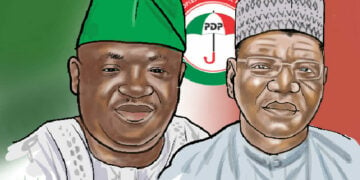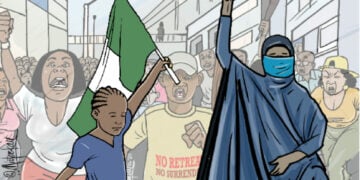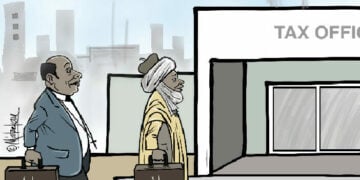Following the G-20 summit held in India, I have been amused by the debate about whether or not Nigeria should be more than a guest again at the next G-20 meeting in Rio, Brazil. If South Africa is a member, why not Nigeria?
How do you offer Africa’s largest economy only a complimentary ticket every time to such an important global event, leaving it with the rather humiliating option of begging for a place?
I thought that we had outgrown the belief that respect is earned by size or by simply hanging out with the right crowd, regardless of performance. If it’s not just another boost for the testosterone of a few African leaders who attend such meetings, it’s difficult to understand why they cannot see that they would have to put their house in order first to earn respect on the outside.
I don’t know what President Cyril Ramaphosa’s membership is doing for South Africa or what the AU membership of the G-20 is doing for the continent. Nigeria’s President Bola Ahmed Tinubu obviously feels that if Ramaphosa can be on the stage at this pageant of global powers, then so can he also.
But I frankly think that both of them and others on the continent have barely paid enough attention to the opportunities that come with building truly vibrant regional and continental institutions. African leaders must pay attention to what is happening back home, in their own backyard. It’s the sheer force of their record of performance that would compel the world to notice and take them seriously.
Lesson from EU
The EU, one of the world’s most prosperous trading blocs today, started as a trading community of six European countries with a combined population of 170m at the time. Today, it has grown to 27 members with an economy of approximately 16 trillion euros.
Apart from the EU’s institutional membership of the G-20, three EU countries – Germany, France and Italy – are also members of the group in their own rights, because of the sheer size of their economies. They didn’t have to beg for membership.
Consider, for example, how shabbily Africa has so far treated the African Continental Free Trade Agreement (AfCFTA), perhaps its single biggest opportunity in decades to remove trade barriers amongst members, lift millions out of poverty and earn a significant spot on the world stage.
Five years into AfCFTA, the continent still pays lip service to free movement of people, with Africans requiring visas to travel to at least 60 percent of the 54 countries, never mind the monumental obstacles to free trade.
Compared to India, for example, where only three compulsory documents are required for import-export processing, Nigeria’s Customs requires nearly 12 to process intra-African goods and services, and you’re just getting started.
While Africa’s population has grown to double that of Europe, intra-African trade accounts for about 11 percent or $170 billion, which is merely five percent of intra-European trade. Intra-African trade also lags intra-Asian trade.
Missed opportunities
Nigeria is not even among the eight countries currently participating in AfCFTA’s Guided Trade Initiative (GTI), a platform that is supposed to boost the region’s trade policy framework. How can Nigeria, which ought to be in the forefront of turning this state of affairs around, but which is sadly one of the laggards in AfCFTA commitments, covet a table at the G-20? And on what terms when, like most of the continent, Nigeria is still largely a market for primary commodities with the inherent disadvantages?
According to Tom Burgis in The Looting Machine, “In Africa, the outflows (as of 2011) amounted to five to seven percent of GDP, the highest proportion in any region and growing at a rate of 20 percent a year. African losses from trade mispricing alone are roughly the equivalent to the continent’s income from aid.”
To add insult to injury, Nigeria, Ghana and Chad were listed by Burgis as first, sixth and ninth respectively among the countries that suffered the worst illicit outflows from 2005. This sounds more like a continent that needs to look after itself than one whose leaders should be hankering for a courtesy ticket for a front-row seat outside.
If you add the current state of political turmoil across a number of countries on the continent, especially the so-called coup belt, the situation becomes even more deserving of serious homework and introspection.
Whereas the OAU of those days challenged apartheid and fought against minority rule and oppression in Zimbabwe and Namibia while supporting more African states to attain political independence, its successor the AU is sleep-walking through multiple conflicts, content to make only perfunctory noises.
Meanwhile, the new crop of military rulers from Chad to Mali and from Burkina Faso to Gabon continue to dig in, sparking a dangerous wave of copycats and self-doubt about the value and use of democratic rule.
Africa’s 1.3 billion population is perennially a source of cheap labour for developed and middle-income countries in a manner reminiscent of the slave trade; while its landmass of 30 million square kilometres has remained a booty for external forces to exploit, loot and cart away as the continent slumbers.
Instead of trying to cross seven seas to join the G-20, Nigeria should be more concerned that even though it was also a guest to the BRICS meeting in Johannesburg in August, it was not among the six countries that would get membership from January 2024, with the two new spots in Africa going to Ethiopia and Egypt.
Indo-China love
What’s more? In an increasingly multipolar world, the unspoken message by absent Chinese President Xi Jinping to the last G-20 meeting, was that his country was no longer happy to play second fiddle to US hegemony. Rather than coveting that same company Nigeria and other African countries should do more to chart their own course. And they can do so without holding out the begging bowl.
Ambition to play in the big league is not a bad thing in itself. A spot on the big stage, however, requires more than a large ego, more than an extravagant claim of untapped potential, and certainly, much more than a sense of entitlement.
For a start, since Nigeria’s president obviously loved what he saw at the G-20 in Delhi he should have asked Indian Prime Minister, Narendra Modi, to share the story of India’s journey to the G-20 with him. As of 2005/2006, more than 640 million people across India were in multidimensional poverty.
A 2019 UNDP report on multidimensional poverty however found that in about six years, the number of multidimensionally poor had fallen from 640 to 365 million. And in just nine years of Modi, access to electricity has increased from 70 percent to 93 percent, while states with basic sanitation coverage across India are over 90 percent.
That is the sort of record that makes a country both an eligible and inevitable member of the G-20 or any other respectable global platform; not covetousness, begging or a sense of entitlement.





